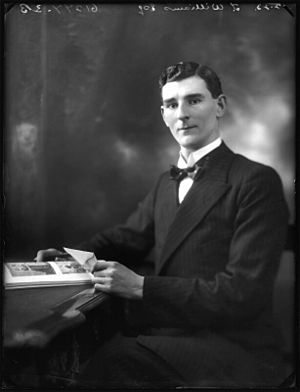Tom Williams, Baron Williams of Barnburgh facts for kids
Thomas Williams, Baron Williams of Barnburgh (born March 18, 1888 – died March 29, 1967) was a British man who started his life as a coal miner. He later became an important politician for the Labour Party. He was also a member of the Privy Council, which is a group of important advisors to the King or Queen.
Contents
Thomas Williams' Early Life and Work
Thomas Williams was born in a place called Blackwell, Derbyshire. He grew up in Swinton in Yorkshire. When he was just 11 years old, in 1899, he started working in a coal mine called Kilnhurst colliery.
As he got older, Thomas became very involved in helping workers get fair treatment. This is called trade unionism. He joined a political group called the Independent Labour Party. During World War I, he briefly joined the British Socialist Party before becoming a member of the main Labour Party. In 1918, he was chosen to be a member of the local council for Bolton-upon-Dearne.
Becoming a Member of Parliament
Thomas Williams was elected as a Member of Parliament (MP) in the general election of 1922. An MP is someone who represents a specific area in the British Parliament. He represented the Don Valley area. He continued to be the MP for Don Valley until he decided to step down in the 1959 general election.
Thomas Williams' Role in Government
Thomas Williams held several important jobs in the government.
First Labour Government (1924)
In the first Labour government, which was in power from January to October 1924, Thomas Williams worked as a special assistant. He helped Noel Buxton, who was the Minister in charge of farming and fishing. This role was called Parliamentary Private Secretary (PPS).
Second Labour Government (1929–1931)
Later, in the second Labour government (1929 to 1931), he was again a PPS. This time, he assisted Margaret Bondfield, who was the Minister for workers' issues.
Wartime and Post-War Government Roles
Thomas Williams first became a minister during Winston Churchill's wartime government, which was a mix of different parties. From 1940 to 1945, he was the Assistant Minister for Agriculture and Fisheries. He worked with Robert Hudson, who was a Conservative minister. In August 1941, he became a Privy Counsellor, which is a high honor.
After the war, when Clement Attlee led the Labour government from 1945 to 1951, Thomas Williams became the main Minister of Agriculture, Fisheries and Food. One of his biggest achievements was helping to pass the Agriculture Act of 1947. This law was very important for farming in Britain.
After the Labour Party lost the election in 1951, Thomas Williams became the main spokesperson for agriculture for the opposition party until 1959.
Life After Parliament
After he retired from the House of Commons (the main part of Parliament) in 1959, he was given a special title. On February 2, 1961, he became a life peer. This meant he could sit in the House of Lords, which is the upper house of the British Parliament, for the rest of his life. He chose the title Baron Williams of Barnburgh, named after Barnburgh in Yorkshire.
In 1965, Thomas Williams wrote a book about his life, starting from when he was a child. The former Prime Minister, Clement Attlee, wrote the introduction for his book.
 | Janet Taylor Pickett |
 | Synthia Saint James |
 | Howardena Pindell |
 | Faith Ringgold |


